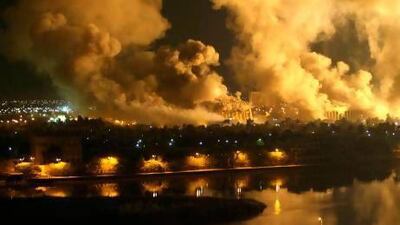KUWAIT CITY // Before the bombs began falling on Baghdad early in the morning of March 19, 2003, the man given the job of finding out the fate of Kuwaitis still missing from the First Gulf War had faced a wall of denial.
Dr Ibrahim Al Shaheen and his colleagues on Kuwait's prisoners of war committee had met Iraqi officials every two months for the previous 12 years.
Each time, the Iraqis obstinately denied any knowledge of more than 600 missing Kuwaitis thought to have been executed when Iraq invaded Kuwait in 1990.
That intransigence dissolved the night after US-led forces seized control of Baghdad on April 9, 2003.
"The Iraqi officers informed us of what information they had about the location of the mass graves," Dr Al Shaheen recalled. "We understand their situation. Under the regime they couldn't say anything. After the fall they felt free."
In the next 12 months, the remains of 236 of the 605 missing Kuwaitis were recovered.
"It was a great relief for us here in Kuwait to see Saddam fall," Dr Al Shaheen said. "But the problem was not in removing Saddam, but what came afterward."
The sigh of relief in Kuwait after the news that Baghdad was no longer in the grip of Saddam Hussein was soon followed by concern, frustration and even bitterness.
Today, relations between the countries of the Arabian Gulf and the nation Saddam once ruled are at their lowest point in decades, and Iraq's once greatest enemy Iran has become its closest friend.
"Iraq was open to Iran and now Iran is number one there," said Mohammed Al Dallal, a former Kuwaiti MP and a leader in the Sunni Islamic Constitutional Movement. "Iran's even stronger in Iraq than America."
Saudi Arabia and other members of the GCC were publicly critical about the decision to go to war in Iraq.
But privately, Riyadh was more indecisive, Saudi historian Madawi Al Rasheed later wrote.
It was happy to see the Baath regime, a long-time regional rival, ousted but it worried about the rise of a Shiite-dominated government if free-and-fair elections were held.
It resolved its ambivalence with an implicit approval for the invasion. Riyadh allowed the US-led forces to use its airspace, while coalition troops staged their march into Iraq from Kuwait and US military aircraft conducted sorties from a base in Qatar.
But ties between Iraq and Arabian Gulf capitals started to sour almost immediately after the invasion.
In protest against the treatment of the country's Sunnis by the post-Saddam administration, the kingdom refused to re-establish its diplomatic presence after the fall of Baghdad.
As sectarian tensions grew into civil war, US officials accused Riyadh of funding Sunni opposition groups.
When a Shiite-led coalition led by Nouri Al Maliki was elected to run Iraq in the country's first free-and-fair elections in 2006, relations between Iraq and the GCC worsened further.
Mr Al Maliki included in his coalition political parties that had spent years of exile in Iran, visited Tehran four times in his first three years in office and played host to the Iranian president, Mahmoud Ahmadinejad, on a state visit in March 2008.
More recently, the Maliki government's most prominent Sunni official, the vice president Tariq Al Hashemi, fled Iraq in late 2011 and took refuge in Qatar after he was accused of operating anti-Shiite death squads. Mr Al Hashemi said the allegations were politically motivated.
Iraq's Shiite-dominated domestic policy is reflected in its foreign policy, with Baghdad criticising the GCC-led intervention in Bahrain in March 2011 to help stop protests there.
The Iraq-GCC divide has grown even wider over the war in Syria. Gulf states have called for a transfer of power in Syria, and Saudi Arabia and Qatar are said to be arming the rebels fighting the regime of the president, Bashar Al Assad.
Meanwhile, Baghdad is quietly helping Tehran's ally in Damascus, reportedly allowing Iran to use Iraqi airspace to supply Mr Al Assad's forces.
In the Syrian uprising, Riyadh and other Gulf governments see an opportunity to redress a regional balance of power that - mainly because of events after the invasion of Iraq - shifted in Iran's favour, says Gregory Gause, a non-resident fellow at the Brookings Doha Centre.
"Saudi Arabia sees Iran as having basically won the contest over the previous 10 years for having increased their influence in Iraq, consolidated their influence in Lebanon and increased their influence among the Palestinians," said Mr Gause.
"Riyadh sees Syria as its one chance to roll the Iranians back."
Today, after 10 often frustrating and dismaying years since the invasion of Iraq, every Gulf state has now had its own strategy for dealing with Baghdad, ranging from cautious openness in Kuwait to what Mr Gause called a Saudi determination to "boycott the Iraqi government". For its part, Iraq has made other conciliatory moves in Kuwait besides returning the remains of Kuwaiti dead.
The first Iraqi Airways flight in more than 20 years landed in Kuwait last month, after Baghdad agreed to compensate Kuwaiti airlines US$500 million (Dh1.83 billion) for damages during the invasion.
But on the streets of Kuwait City, any mood of reconciliation is tempered by recent memory.
Iraq's invasion and occupation of Kuwait in 1990 still haunts the city. So does the belligerence of the man whose regime was finally ousted a decade ago.
"The relationship with Iraq has always been cautious," said Fayez Al Rafidi, a retired official from the Amiri Hospital in Kuwait City.
In the First Gulf War, Mr Al Rafidi photographed and fingerprinted Kuwaitis who had died in the fighting so their families would have a record of what happened to them.
"There was always a level of danger that we felt with Iraq, even before the invasion - and it's the same as what we feel now," he said.
twitter: For breaking news from the Gulf, the Middle East and around the globe follow The National World. Follow us

